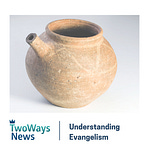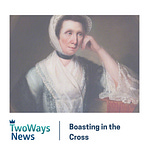We have another grandson on the way. We’re still a few months away from meeting him, but his parents have already decided what he’ll be called, and have even let the rest of the family in on the choice.
And so Little Nick has become a someone in our family already. We talk about how well-defined his leg muscles are in the ultrasound (‘bound to be a good rugby player!’), and we joke about whether his personality will end up being like his name-sake (another Nick in our family).
In a very real way, Little Nick is already part of the crew. We know him and love him, even though we haven’t yet met him.
This is perfectly normal, but also a bit strange when you think about it. Little Nick has none of the normal faculties or properties of a human being that we could relate to. Apart from the miracle of ultrasound he is entirely absent to us. We can’t see, hear, touch or speak to him. Nor he us. And yet we joke about him already, include him in the conversation, and make preparations for his arrival—as if he is a long-lost relative soon to arrive from overseas.
God of course knows Little Nick far better than we do. He is knitting him together in his mother’s womb, in the famous words of Psalm 139. In fact, Psalm 139 goes quite some way further in its description of God’s knowledge of us before our birth. His eyes see us when we are hidden from everyone else, when our ‘substance’ is as yet ‘unformed’. Every one of our days is already written in his book, before any of them have to come to be.
The conclusion that we often draw from Ps 139 is that the life of the unborn child is clearly a human life, and thus valuable, even sacred. It is hidden and still in formation, and yet it is a real life all the same—a life that God knows and loves, and that we should also love and protect.
All the same, when we talk about abortion with non-Christian friends or in social debates, we feel that quoting Psalm 139 might not cut much ice. And it probably won’t.
Accordingly, we often find ourselves drawn into arguments about what constitutes pre-natal human life, and whether the unborn baby has enough of the required characteristics or properties to qualify. Does his possession of the complete human DNA package render Little Nick definitely a human being? Or is more required before we treat him as an independent life in his own right (and not simply part of his mother’s body)? Is it the point at which his heart begins to beat? Or the development of his brain stem? Or his ability to feel pain?
At 38 weeks, when Little Nick is fully grown in the womb and ready for the short agonising journey down the birth canal, it seems absurd and arbitrary to suggest that he is not a human life worthy of all our protection. But at the other end of the process, when he is just a microscopic clump of cells, he looks much less like a human life and more like a piece of tissue. And many everyday people find it easy to persuade themselves that this clump of cells is not enough of a ‘human being’ to be worthy of protection.
Arguments about what properties or faculties need to be present in order for a life to be recognized as ‘human’ don’t tend to get very far. Who gets to set the standard or draw the line? We want to be able to say that there is something essentially human about unborn Little Nick, regardless of whether he does or doesn’t yet possess certain abilities or properties.
But that only gets us to another conundrum. What is that human ‘essence’? How would you define it? Is it a ‘soul’?
Psalm 139 may help us get past this, even if we don’t always feel able to quote it in conversation.
When the psalmist refers to God’s knowledge of the unborn child, it is not unborn human life in general that he refers to, but his own. You knitted me together; you saw my frame when I was being made; your eyes saw my unformed substance; and so on.
The unborn life in the womb is a Someone—the psalmist—whose identity and personal history stretches in an unbroken line from his hidden formation in the womb to the time many years later when he looks back, and reflects on God’s knowledge of him prior to birth (in Psalm 139). We discover that the life in the womb is a person—the same person who is writing the psalm.
After Little Nick is born (God willing), we will one day say to him, “We used to talk about you, when you were still in your mummy’s tummy”. The ‘you’ that is Little Nick in that sentence is the same person that was in his mother’s womb.
We all know this about ourselves, and each other. The ‘you’ that is ‘you’, and the ‘me’ that is ‘me’, started well before either of us were born. Our parents and relatives identified us and talked about us when we were in the womb; and we can look back and talk about our pre-birth selves now.
The real question, then, is not whether unborn babies have sufficient human properties or not, but whether they are persons. Are they able to be identified and addressed as unique and irreplaceable Someones, who already are in personal relationship with others—like Little Nick is? Will they continue to have an unbroken personal identity and history within that web of personal relationships (if we don’t kill them first)?
If so, then they are persons, and deserve to be loved. They are not things or objects to be disposed of at will.
When discussing abortion, I suspect we will do better to talk less about the sanctity of life, and more about the uniqueness and preciousness of persons. We don’t have to make an argument for treating people differently from things. In fact, as soon as we identify someone as a Someone—as a person rather than a thing—we experience the moral demand that they make upon us.
If I encounter a person on the street, we’ll do that dance together where we figure out which of us is going to step this way or that to avoid a collision. If I encounter an empty cardboard box on the footpath, it’s not the same kind of interaction. I might casually push it to one side with my foot, or I might even pick it up and put it in the bin so that someone else doesn’t have to. But the very existence of a Person walking towards me makes me immediately aware that I have an obligation to relate to him or her differently.
Everyone understands and accepts this. People are special, and worthy of respect and consideration and love. You can’t treat people like things. You can’t just kill people when their existence makes your life harder. Those people who don’t understand this we tend to call psychopaths.
The unborn child is a Someone that we can name and identify and relate to in love. That makes him (or her) a person, from the very beginning. And persons demand that we treat them as persons, not as objects.
I wonder if this might be a more fruitful kind of conversation to have with our pro-choice friends. And if they are struggling to accept the point, perhaps just ask them this question:
When you were in your mother’s womb, was that you in there?
PS
Deep waters here. The philosophy of personhood is one of those complicated attempts to describe something we all implicitly understand. None of us need to be told what a ‘person’ is, or how to tell the difference in everyday life between a Someone and a Something. But trying to account for that difference philosophically is no easy task. ‘Personhood’ is not made up of any particular set of characteristics or properties. Take away any of your human abilities or characteristics (temporarily or permanently), and you would still be You. Who we are is not interchangeable with what we are.
That last sentence is pretty much a direct quote from Robert Spaemann’s book, Persons: The Difference between ‘Someone’ and ‘Something’ (Oxford studies in theological ethics; Oxford University Press, 2006). If you’d like to hurt your brain delving deeper into this issue, I’d recommend Spaemann.
The other indispensable resource for all these discussions is Megan Best’s Fearfully and Wonderfully Made: Ethics and the beginnings of human life (Matthias Media).
This is a partner post. Thanks again for your support and encouragement, including the various bits of feedback I’m continuing to get about singing, music and the affections. When I record the first of the new Q&A interviews later this month, I’ll no doubt return to that subject!
And if you happen to be reading this post because a subscriber shared it with you—welcome! Here’s how to get The Payneful Truth every week, and more besides …
This week’s image is of Little Nick himself, with his well-defined leg muscles.











